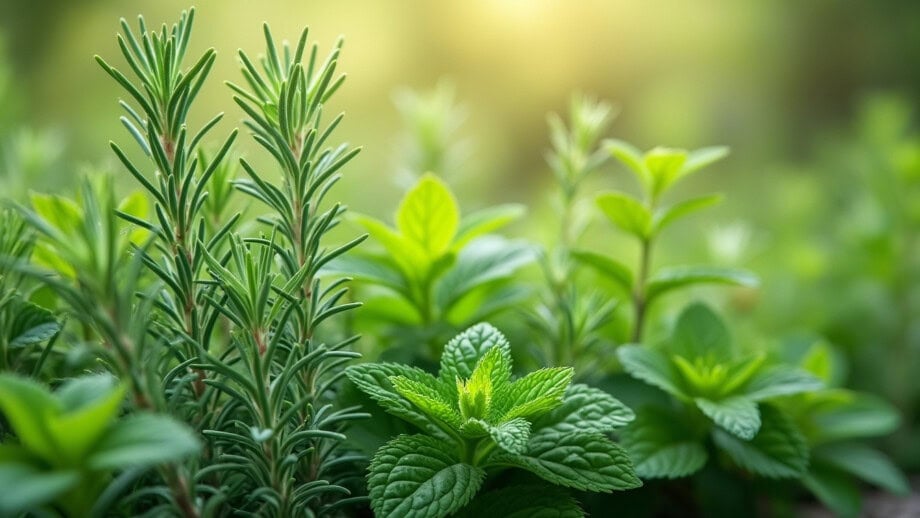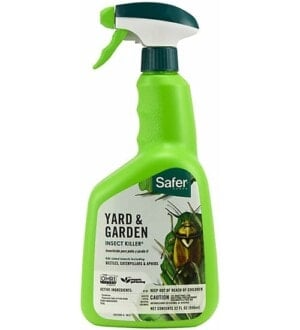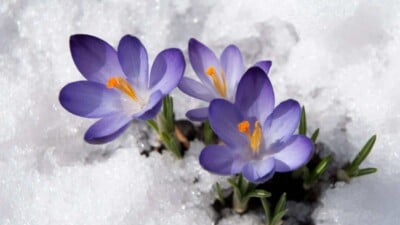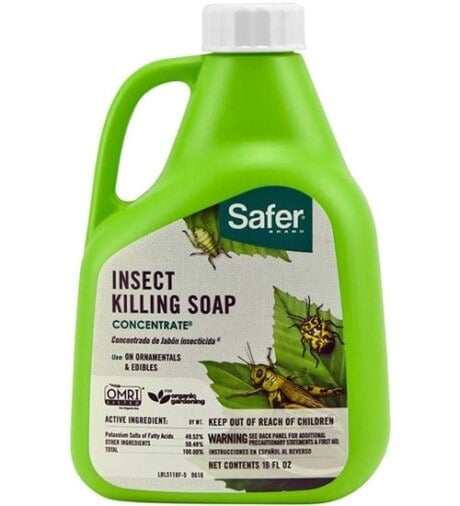General Care
Caring for your herb garden is easy, but keep an eye out for bugs, slugs and other thugs. Here we list common varieties and the problems associated with them.


Best product
for SAFE Pest Control
Yard & Garden
Kills aphids, beetles, ants and caterpillars on contact, yet is gentle on plants.
$9.95Learn moreHerbs are considered to be the hardiest of all garden plants. They have relatively few problems with insects and disease. In fact, many of them naturally repel pests – studies show they don’t taste or smell good to them. Some herbs, like rosemary and sage, may even prefer conditions that most vegetables couldn’t survive in. Herb gardens often requires less fertilizer than other food crops and they are much more drought tolerant (visit our herb growing guides here). That said, there are some scourges you need to watch out for:
Basil: Aphids and slugs often attack basil. Watch closely and treat with organic controls when necessary. Select a planting site that drains well and with good air circulation to reduce fungal diseases.
Chives: Watch for aphids on chives. If found, knock insects off plants with a heavy spray of water or apply insecticidal soap.
Cilantro: Watch for powdery mildew and apply organic fungicides if symptoms appear. Cilantro rarely has problems with pest insects.
At Planet Natural we carry a large selection of organic pest control products that are guaranteed SAFE and effective. Got bugs? Visit our Pest Problem Solver for pest pictures, descriptions and a complete list of earth-friendly remedies.
Dill: Occasionally the tomato hornworm will attack dill. If damage is severe, apply Bacillus thuringiensis (Bt) as soon as possible.
Marjoram: Aphids, spider mites and some plant diseases may attack marjoram. Treat with insecticidal soap or other organic insect control, if necessary. To prevent many fungal problems, provide good air circulation around plants and water on sunny mornings, to allow the leaves to dry by evening.
Mint: Aphids, cabbage loopers, flea beetles and spider mites are all common garden pests found on mint. Apply least-toxic, natural pesticides to prevent insect damage. Also, watch closely for plant diseases such as rust and anthracnose. If found, hand pick infected leaves and apply organic fungicides.
Oregano: Watch closely for aphids, leafminers and spider mites, especially on plants grown in containers. If pests are found, use least-toxic, organic pesticides, when necessary.

READY-TO-USE FORMULA
Liquid Copper Spray
Use as a dormant or growing season spray on fruits, flowers and vegetable crops.
Original price was: $11.95.$2.20Current price is: $2.20.Learn moreApproved for organic gardening! Bonide® Liquid Copper Spray controls a wide range of plant diseases, including powdery mildew, rusts, black spot, late blight and more. May be applied as a dormant or growing season spray on flowers, fruits and vegetables.
Parsley: The larvae (caterpillar) of the black swallowtail butterfly is particularly fond of this herb. Handpick pests if found. Also, watch closely for signs of fungal disease. If necessary, remove infected leaves and apply copper spray or other organic fungicides early.
Rosemary: Whitefly and spider mites will attack rosemary. Monitor frequently and apply organic pest controls if insects arrive. Damp conditions will encourage botrytis rot. Remove infected plants.
Sage: Slugs and spider mites can be a problem on sage. Watch closely and dust with diatomaceous earth, if necessary. Common plant diseases found on sage include powdery mildew, rhizoctonia, and verticillium wilt. Select a planting location with good drainage and air circulation to prevent many fungal problems from occurring.
Tarragon: Plant diseases, such as powdery mildew, downy mildew and rhizoctonia (root rot) may attack tarragon. To help prevent these problems, plant in areas that provide good air circulation and water on sunny mornings, to allow the leaves to dry by evening.
Thyme: Common garden pests attacking thyme include spider mites and aphids. Look for these insects on new plant growth and on the undersides of leaves. If found, knock pests off plants with a heavy blast of water or use insecticidal soap. Thyme is also susceptible to botrytis rot and rhizoctonia (root rot). Select planting locations with good drainage and plenty of air circulation to help prevent these problems.

Winterizing the Garden
Depending on your climate and what herbs you are growing, winter time can be killing season for your plants. Many herbs have shallow root systems that are easily damaged by spring thaw or the freezing of soil in the late fall (see Winterizing the Herb Garden).
To ensure winter survival, start out with healthy plants that will better weather winter. That means growing your plants in the proper soil and with the right amount of light.

#1 FROST FABRIC
N-Sulate
Start planting earlier in the season for a longer flowering and growing period.
$14.95Learn moreEnjoy your garden longer! Frost Fabric (N-Sulate) is a medium weight, permeable, UV treated cloth designed to protect plants from frost, cold and freezing temperatures. Protects tender plants by raising the temperature beneath the fabric by 6-8°F.
You’ve worked hard to make your gardens the best they can be. Provide protection from frost, pests, deer and other nuisances. Check out our covers, cold frames, even high-tech deterrents to bring yourself peace-of-mind. Why worry? Protect!
Avoid fertilizing and pruning late in the growing season. Leaves and other plant growth tends to help insulate plants during the cold winter months. It’s just like growing a beard in winter and then shaving it off during the hot summer months.
In addition to natural ground cover, consider mulching to protect and keep your herbs warm when temperatures plummet. Spread a loose mulch such as evergreen boughs, straw or oak leaves about four-inches deep. Avoid material that will pack down and get mushy during the winter months. Too much moisture will cause your plants to rot (see Making the Most of Mulch).
Also, choose the right time to mulch. Don’t do it until the ground is frozen and only remove the mulch after you’ve seen signs of new growth in the early spring. If, despite your best efforts, your mulch gets compressed due to heavy snows, remember to fluff it up in early spring before growth begins.
Remove less than hardy plants, such as rosemary and Greek oregano, which probably won’t survive the winter chill. Instead, dig them up, place in pots and let them winter inside. They’ll be happier and so will you when they survive to give you another season of fresh herbs come summer.













